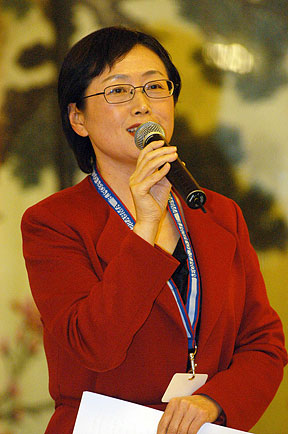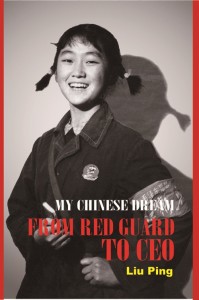An Interview with Liu Ping: Author & Entrepreneur
Sylvia: Welcome Ping. Please give our readers an introduction of yourself and a little about your book.
Ping: Hello Sylvia, I am Liu Ping. This new book takes the old tried and true sent-down-to-the-countryside Chinese Cultural Revolution memoir and turns it on its head by infusing the story with entrepreneurial flair: using years of turmoil and despair as the launching point for an incredible true story of dedication and single-minded determination. Far from riding the pro-China propaganda train, My Chinese Dream is instead a startlingly frank, warts-and-all, rags to riches fairy tale that reveals the excruciating years of mass social reform in China in the 1960s and 1970s, while at the same time perfectly capturing the early entrepreneurial spark of the “opening up” period of the 1980s and 1990s, when many hard working, forward thinking Chinese businesspeople rewrote the rule book for achieving success within the rigidly-defined social structure. This incredible true story is a must-read for anyone interested not only in China, but in entrepreneurship, personal development, and overcoming adversity.
I was born in Liaoning Province, China, in 1955. When I was 15, she was sent to work in a phosphate mine. After graduating from college she became a teacher as well as an interpreter for China’s Ministry of Chemical Industry. When I was in her 30s, I joined one of China’s largest travel and tourism companies and was heavily involved in professional and cultural exchanges with many foreign companies. My interpersonal skills would eventually launch me on a solo career as one of China’s most successful female entrepreneurs. Today I am CEO of a private company the China Star Group, one of China’s most successful DMC (Destination Management Company) and PCO (Professional Conference Organizer) companies with offices in Beijing, Shanghai, and Hong Kong.
Sylvia: What inspired you to write your first book?
Ping: I have been involved in foreign affairs since the beginning of the 1980s and since then have had many opportunities to work with westerners. During these years, I feel that the most difficult thing to achieve was to get westerners to truly understand China. Regardless of whether their impression of China is positive or negative, there is always some deviation from the truth. Even those who come to China regularly seldom have the opportunity to know the inner world of a Chinese person due to the language barrier and the different cultural background. Most westerners get knowledge of China from the media, which is quite often biased or misleading. China is such a big and time-honored country, with a complicated history, that sometimes when you say something, you have to spend more time explaining the background of the story than the story itself. In most cases, there isn’t the time for a thorough explanation. Sometimes the more we explain, the more confused they get. So now when my foreign friends ask me questions which I can’t answer in a short time, I will simply say, “Read my book.” That is why my book is as thick as 556 pages.
I like to communicate with people and pursue mutual understanding, friendship and support with them. I have a strong impulse to express something whenever there is any misunderstanding about China and the Chinese people from westerners because they don’t know us enough. Therefore, I decided to write a book and share my stories with my friends from the West. I think I am a good representative of China and Chinese people. I was born and brought up there. At the same time, I am very international. I have experienced the whole of the Cultural Revolution and the economic reform and opening up, during which, I was not a bystander, but a wave rider. No matter what happened, I was the witness.
I only tell true stories in my book, no judgments. I do not preach or criticize any thoughts or systems. I just try to convey the true feelings of the Chinese people. For example, in my book, I express my love and worship for Chairman Mao in my youth. No matter how naïve, how crazy, how blind I may have been, it was really me. They were my real emotions at that time. I am just telling the true history and my own stories, making no comment on what’s right and what’s wrong.
I trust the readers’ wisdom and let them judge.
I wrote in my book “You can criticize our system and our government, but don’t hurt Chinese people’s feelings”. What do I mean by “Chinese people’s feelings”? This is what I want to tell the readers. It is also the most important purpose of this book.
I want to convey the feelings of Chinese people, not only my personal feelings. When writing this book, in order to prove that my feelings can represent what the majority of Chinese people feel, I did a lot of interviews. I love that my publisher defines my book as a documentary novel instead of autobiography, because those stories are not only about me, they are also about my generation and the Chinese people.
Many Chinese people can’t share their stories with the world because of the language barrier, but I do not have this problem. Those who are of my age that I interviewed are all willing to share their life experiences with western friends through my book. So I had a sense of mission when I was writing this book.
This book also covers some so-called “sensitive topics” in the chapter Stories of Common Chinese, such as religion, ethnic minority, Taiwan issue, Tibet issue, family planning and noncommunist parties. The purpose of this chapter is to tell the readers what we have experienced and what Chinese people think about these issues. I also try to give the background information of these topics to the readers by telling the stories of me, my family and people around me.
These topics are where my friends and I are most likely to have different opinions. My friend Kitty, who is from Taiwan, read the part about Taiwan and told me she agreed with 70% of what I said, while she disagreed with 30% of it. Another friend, Gert from the Netherlands, told me that he agreed with all the opinions in my book except those about the Tibet issue.
I told them that it doesn’t matter. The purpose of my book is not to impose my opinions on you, but to let you know how we really feel. I also want to convey the message, which is, even if we have different opinions, we can still become good friends, seeking common ground while accepting the existing differences.
I have made a lot of contrasts in my book so that the readers can compare China’s past and today, see the changes, the progress, and get a better understanding of China and the Chinese people. I also try my best not to hide the problems existing in today’s China.
Another important purpose of this book is to let my son and the young people of his generation understand what their parents experienced during that period of history and how they struggled for a better life. It’s a period of history that won’t repeat itself, so they need to know about it.
My son told me that he could hardly believe the Cultural Revolution was something that truly happened just more than ten years before he was born. When he read about how hard the people of my generation worked o realize our dreams during the reform and opening up, he was moved, inspired and adored me as his role model. I take it as an extra bonus of writing this book.
As I said in the postscript of this book, “Another important purpose of this book is to express my love for my motherland. I am not sure if it is achieved in this book. When I am making a speech to the Western audience, no matter what the topic is, there are always some people who tell me that they can feel my love and passion for my country, though during the whole speech, I usually don’t directly express that feeling. I hope this book can achieve the same effect.”
If this book helps you get a better understanding of China and Chinese people, then it has been achieved its primary goal.
Sylvia: Wow, very powerful Ping. It really sound like a great book full of rich content! Is there a message in your novel that you want readers to grasp?
Ping: Know the true and be inspired, seeking common ground while accepting the existing differences
Sylvia: Do you have any advice for other writers?
Ping: I would like to say “write from heart”, since I wrote a memoir. It is always the sincerest words touch people the most. The other thing is, get started! Don’t wait until you are “Ready”.
Sylvia: What marketing techniques have you used to sell your books and which ones have been most successful?
Ping: I was the guest speaker in “San Francisco Business Women Networking” event, along with many other women leaders in National Association of Women in Business. My book will also be featured in many book trade shows, and International conference meetings. My publisher has launched social media campaign for me.
Sylvia: Why should we buy your book?
Ping: My book is the first-hand information and experience about the Cultural Revolution, the Opening-up and the struggle and pain as a female entrepreneur. I’m very honest about my feelings and thoughts, especially frank about the fact and truth.
Sylvia: Is there a special place that you prefer when you write?
Ping: My Office room, nice and quiet.
Sylvia: What projects are you currently working on?
Ping: I’m still a full time CEO, writing is my hobby and interests. I’m looking to write more about how to do business in China, my personal/business experience and encounter with all kinds of people from the world in the future.
Sylvia: What is your POWER WORD? Why this word?
Ping: Love
Sylvia: Awwww, LOVE! All we need is love. What a beautiful word. Ping, thank you for sharing your story. Please share your social media and book contact information.
Ping: Thank you Sylvia. I appreciate the opportunity. My contact information is below:
- Website: www.webonchina.com
- Website: www.chinabooks.com
- Facebook: http://tiny.cc/yehrrw
- Amazon: http://tiny.cc/5ohrrw

Sylvia Browder is CEO of Specialty Home Services LLC, a Home Improvement Company; a Small Business Consultant at Browder Consulting Group, a startup consultancy firm to help women with startup assistance, marketing, website and graphic design work and other support services. In addition, she has co-authored several published books; publisher of ‘Sylvia Browder’s Blog for Women Entrepreneurs’ a lifestyle blog; and publisher of ShopSpendBlack.com Business Directory & Blog platform created to help consumers find black owned businesses in a searchable format. In her spare time, she enjoys spending time with her husband of 30 years; 5 adult children and 5 grandchildren; church; friends and motorcycle riding.


















